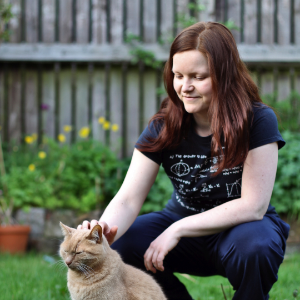
Today's real-life maths story is about difficulties with oranges.
Almost everyone in their life has needed to find the best value for some goods. Should you get a bigger package or the package on a sale? For some people, it's an everyday question. It helps us with budgeting, so I recommend mastering it.
Anyway, the other day, we found out that all the usual orange supplies from markets are waxed. The problem for us vegans is that the wax is from an animal source.
And I'm fairly orange-addicted, so we had to look at organic, unwaxed oranges.
Our brief look at the internet gave us these few options to compare:
- Sainsbury's organic oranges - 4x per £1.75
- Organic oranges from an online delivery company - 8 kg per £14.20
- Tesco organic oranges - 5x per £1.75
One more piece of information from the Tesco site was that a typical orange is 155 g.
The trouble here is that some prices are per orange, others per kilogram. How to work this out? We need to work out different units and convert them. In the end, we can either compare the price per orange or the price per 1 kg. (Another usual way is to work out how much of the goods we can get for £1 or any reasonable amount of money.)
Here we had two sources in terms of oranges and money per pack, so the easiest way was to work out the bulk 8 kg into a number of oranges.
First, to get the easy bits: we already know the price is the same for Sainsbury's and Tesco, and we'll get more oranges in Tesco, so obviously, the price per orange is better there than in Sainsbury's. But out of curiosity, we can work out the figures to see the difference:
- Sainsbury's: £1.75 / 4 = £0.44 per orange
- Tesco: £1.75 / 5 = £0.35 per orange
But now, how about the online delivery?
If one orange is typically 155 g according to information we gathered before, we'll use it as a guide to work out how many oranges are in 1 kg and later in 8 kg.
1 kg = 1000 g
1000 g / 155 g/orange = 6.45 (reasonably rounded) oranges per kg
For 8 kg: 8 kg * 6.45 oranges/kg = 51.6 oranges (of roughly 155 g mass each)
Hooray! Almost there =)
The price for our 51.6 oranges in 8 kg is £14.20. Therefore: £14.20 / 51.6 oranges = £0.28 per one orange from the online delivery company.
The last bit is to find out the price of delivery and find out whether it's still better than going to the nearest Tesco (or what the price for delivery from this shop is).
Another thing to consider might be the actual mass of those oranges — whether any of them would significantly differ from the mass (155 g) we worked with above.
All of these are just small things to consider, but the main maths is done the way I showed above.
I should mention my partner did this whole maths on his own =) So even if you finished with maths at GCSE level a decade ago, you will still use this level of maths knowledge in your life.
Update from future Veronika: When I was recently going over the blog as a part of my routine to improve my English (every couple of years, it gets better and better, so it's worth polishing the articles), I couldn't help but add here our recent find: Organic Unwaxed Oranges from CrowdFarming.
(A different company than the online delivery mentioned above, I don't remember anymore who they were, it's been a long time ago.)
If you want to support farmers directly and get extra credit for your first order, use our referral link to order fruit for CrowdFarming (you don't have to buy only oranges).
Last time, we got 10kg of oranges, and they stayed juicy and fresh for three weeks before we ate them all!

Yeah, obviously, those are apples and oranges. Believe me or not, I don't have a dedicated bowl for oranges only; I mix my fruit together in one bowl like a heathen...


